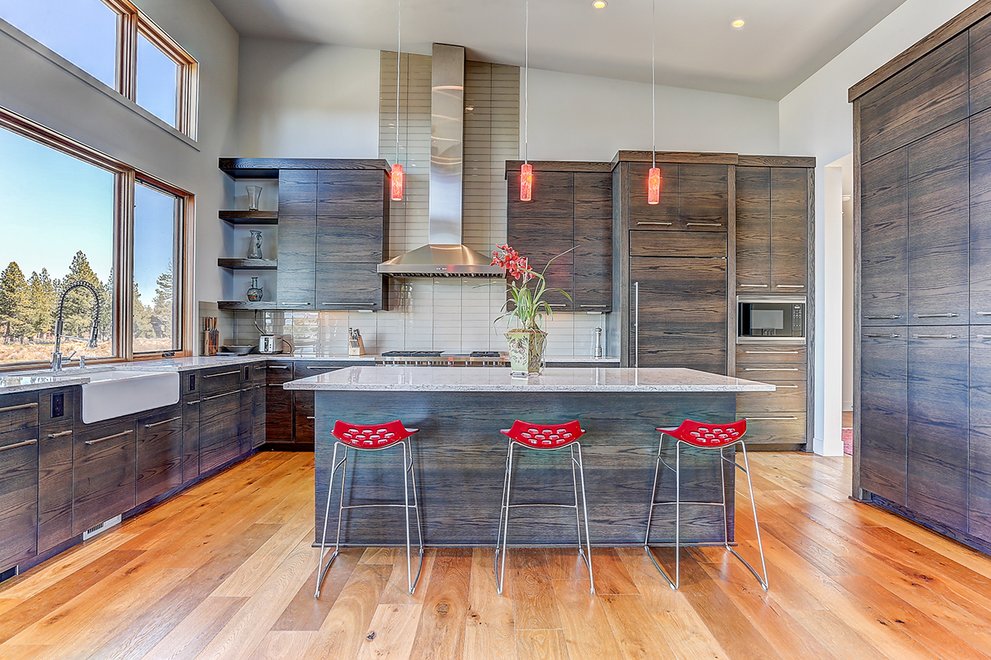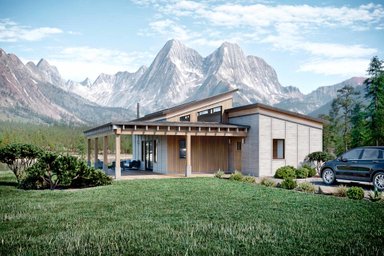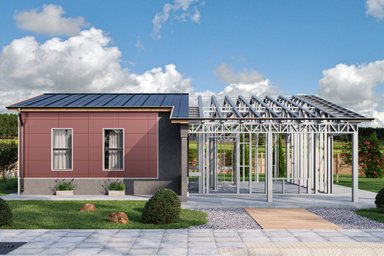What makes flooring sustainable? Renewable sourcing, durability, non toxicity, and a low carbon footprint are all key factors.
Bamboo
Technically not a wood but a grass, bamboo rates high as a sustainable flooring product because it grows quickly, maintains its root system, has a low carbon footprint and is available as a flooring product with low or no VOCs (volatile organic compounds). The one drawback with bamboo is that most of it is harvested in China. As a result there are substantial carbon costs associated with shipping it to the United States. Bamboo is a long lasting flooring product and comes with a 10- to 25-year warranty. For bamboo to achieve its maximum hardness, it should not be harvested for 5- to 7-years. Many cheaper bamboo products on the market are harvested after only 3 years, which is much softer and dents more easily than mature bamboo. Check to make sure your flooring is made from mature bamboo forests (image courtesy Cali Bamboo.)
Bamboo is available as solid strip flooring or as a laminated flooring product. Solid bamboo can be nailed like traditional hardwood flooring or it can be glued to the subfloor. Engineered bamboo floors are made with a veneer of bamboo glued to a substrate of high density fiber board. It is essential to install over a floor with a low moisture content and with a vapor barrier. Engineered bamboo floors are available with easy to install click mechanisms that allow for floating floors or in traditional solid wood strips. Strand Woven Bamboo Flooring is the strongest type of bamboo flooring. Strips of bamboo are coated with resins and then compressed. This process produces bamboo flooring that is twice as hard as traditional bamboo. Carbonized bamboo is heated until the wood takes on a rich, bronze color. The wood is very beautiful but the process makes the bamboo softer. To offset the softness, use carbonized, strand bamboo.
Often the price of bamboo will depend on the finish that is applied to the surface. Low quality materials will usually have only two or three coats. For best results, the bamboo should be coated at least six or seven times. Aluminum oxide is considered one of the best finishes available. Bamboo costs between $2 to $4 per square foot and requires minimal maintenance but should be kept free of dirt and grit. Spills should be cleaned up immediately. Don’t’ install bamboo in areas that are subject to water such as the bathroom. If installed in the kitchen, use area rugs in places where water is present.
Cork
Cork flooring is made is from the bark of the Cork Oak. The oak bark is removed without harming the tree. The bark will grow back after 8 to 10 years and the process is repeated. Cork is a comfortable, warm, resilient flooring material. It is low in VOCs and it is durable. The resilience makes it perfect for high traffic rooms such as the kitchen or laundry room. Engineered cork floors that have a fiber board substrate should not be installed in water-prone areas. Cork flooring is available in Click, Sheet, or Tile products and costs between $1.50 and $3.50 per square foot (image courtesy Lumber Liquidators).
All cork floors should be installed with an underlayment. A variety of “sustainable” underlayments offer sound absorption, moisture protection and can even out the surface beneath the flooring. Some underlayment are made from recycled tires or recycled clothing, and have vapor barriers built into them. Underlayment costs between $50 and $200 per 100 square feet. Cork needs to be re-sealed with protective coats of polyurethane every few years. It should be kept clean and dry. Spills should be cleaned up right away.
Linoleum
Linoleum is made from linseed oil, wood flour, ground cork and jute, all renewable natural materials. The Marmolum brand of linoleum is nontoxic and anti-microbial making it an ideal flooring for people
with allergy or respiratory issues (Forbo Marmoleum image courtesy Green Building Supply). Marmoleum comes in a huge array of colors and in sheet, tile, or click style planks. It is 100% natural and 100% biodegradeable. Marmoleum tiles cost between $3 and $4 per square foot.
Whichever flooring you choose, evaluate the details supplied by the manufacturer. Consider the hardness, the maintenance, the VOC off -gassing and other features that contribute to a successful and environmentally safe project.
Bamboo
Technically not a wood but a grass, bamboo rates high as a sustainable flooring product because it grows quickly, maintains its root system, has a low carbon footprint and is available as a flooring product with low or no VOCs (volatile organic compounds). The one drawback with bamboo is that most of it is harvested in China. As a result there are substantial carbon costs associated with shipping it to the United States. Bamboo is a long lasting flooring product and comes with a 10- to 25-year warranty. For bamboo to achieve its maximum hardness, it should not be harvested for 5- to 7-years. Many cheaper bamboo products on the market are harvested after only 3 years, which is much softer and dents more easily than mature bamboo. Check to make sure your flooring is made from mature bamboo forests (image courtesy Cali Bamboo.)
Bamboo is available as solid strip flooring or as a laminated flooring product. Solid bamboo can be nailed like traditional hardwood flooring or it can be glued to the subfloor. Engineered bamboo floors are made with a veneer of bamboo glued to a substrate of high density fiber board. It is essential to install over a floor with a low moisture content and with a vapor barrier. Engineered bamboo floors are available with easy to install click mechanisms that allow for floating floors or in traditional solid wood strips. Strand Woven Bamboo Flooring is the strongest type of bamboo flooring. Strips of bamboo are coated with resins and then compressed. This process produces bamboo flooring that is twice as hard as traditional bamboo. Carbonized bamboo is heated until the wood takes on a rich, bronze color. The wood is very beautiful but the process makes the bamboo softer. To offset the softness, use carbonized, strand bamboo.
Often the price of bamboo will depend on the finish that is applied to the surface. Low quality materials will usually have only two or three coats. For best results, the bamboo should be coated at least six or seven times. Aluminum oxide is considered one of the best finishes available. Bamboo costs between $2 to $4 per square foot and requires minimal maintenance but should be kept free of dirt and grit. Spills should be cleaned up immediately. Don’t’ install bamboo in areas that are subject to water such as the bathroom. If installed in the kitchen, use area rugs in places where water is present.
Cork
Cork flooring is made is from the bark of the Cork Oak. The oak bark is removed without harming the tree. The bark will grow back after 8 to 10 years and the process is repeated. Cork is a comfortable, warm, resilient flooring material. It is low in VOCs and it is durable. The resilience makes it perfect for high traffic rooms such as the kitchen or laundry room. Engineered cork floors that have a fiber board substrate should not be installed in water-prone areas. Cork flooring is available in Click, Sheet, or Tile products and costs between $1.50 and $3.50 per square foot (image courtesy Lumber Liquidators).
All cork floors should be installed with an underlayment. A variety of “sustainable” underlayments offer sound absorption, moisture protection and can even out the surface beneath the flooring. Some underlayment are made from recycled tires or recycled clothing, and have vapor barriers built into them. Underlayment costs between $50 and $200 per 100 square feet. Cork needs to be re-sealed with protective coats of polyurethane every few years. It should be kept clean and dry. Spills should be cleaned up right away.
Linoleum
Linoleum is made from linseed oil, wood flour, ground cork and jute, all renewable natural materials. The Marmolum brand of linoleum is nontoxic and anti-microbial making it an ideal flooring for people
with allergy or respiratory issues (Forbo Marmoleum image courtesy Green Building Supply). Marmoleum comes in a huge array of colors and in sheet, tile, or click style planks. It is 100% natural and 100% biodegradeable. Marmoleum tiles cost between $3 and $4 per square foot.
Whichever flooring you choose, evaluate the details supplied by the manufacturer. Consider the hardness, the maintenance, the VOC off -gassing and other features that contribute to a successful and environmentally safe project.






